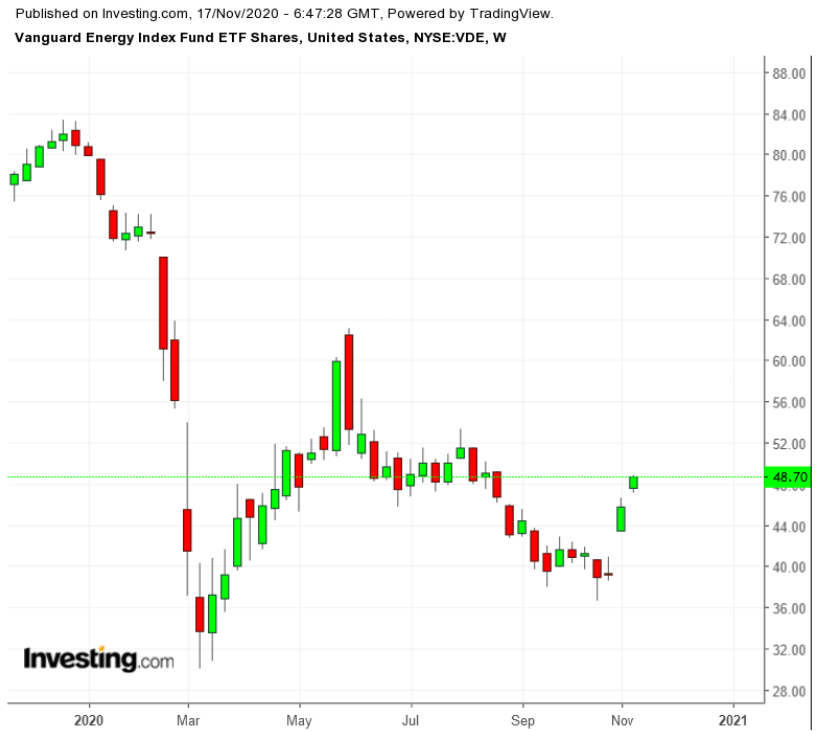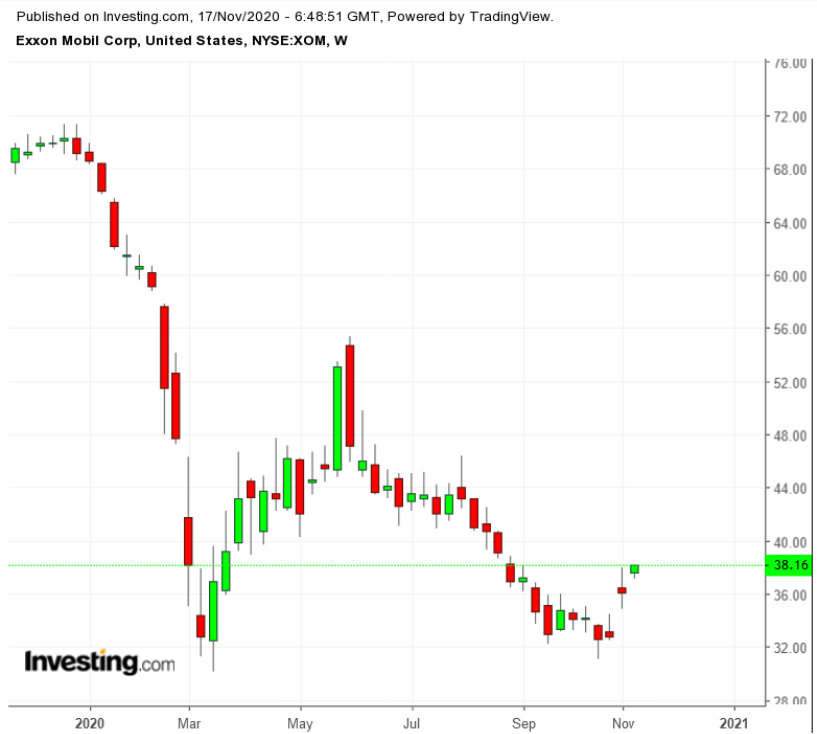After taking a severe blow since the COVID-19 outbreak in March, big oil stocks are showing some signs of life.
The Vanguard Energy Index Fund ETF (NYSE:VDE)—whose top 10 holdings include Exxon Mobil (NYSE:XOM), Chevron (NYSE:CVX) and Phillips 66 (NYSE:PSX)—has massively outperformed the S&P 500 during the past month. It’s up about 11% compared with the benchmark stock index, which has gained just over 1%.

This impressive run comes as a result of investor optimism that the worst is over in this highly cyclical segment of the market, as successful trials of vaccines to fight the COVID-19 pandemic restore expectations of full economic activity, boosting demand for energy products.
Pfizer (NYSE:PFE) and BioNTech (NASDAQ:BNTX) announced earlier this month that their coronavirus vaccine was 90% effective in late stage tests. Another developer, Moderna (NASDAQ:MRNA), said yesterday that its Phase 3 trial data shows its vaccine is more than 94% effective in preventing the virus, a result CEO Stephane Bancel called a “game changer.”
These positive developments have sparked hope among investors that economic activity will normalize in 2021. According to the International Energy Agency, vaccine progress could provide a significant boost to demand in the second half of 2021 after facing a significant slowdown from the latest wave of lockdowns.
In their outlook for 2021, Morgan Stanley strategists recommended investors to remain “patient” in commodity markets.
“This global recovery is sustainable, synchronous and supported by policy, following much of the ‘normal’ post-recession playbook,” they wrote in a note carried by Bloomberg. “Keep the faith, trust the recovery.”
Oil Super Majors Rebound
With these optimistic forecasts about the global economy and un uptick in oil prices, some of the worst-hit oil stocks have shown strong performance during the past two weeks. Trading at $37.59 on Monday morning, Exxon is about 20% higher since Oct. 28, while another oil super major, Chevron, is up about 30% during the same period.
Despite this impressive move, there are still many risks that could derail this recovery and continue to make oil investment a risky bet for long-term investors.
In the short-run, new lockdown measures in Europe and weakening consumption in the Americas will result in global oil demand taking a larger hit in 2020 than previously expected, the Organization of the Petroleum Exporting Countries said last week.

That means it will take much longer for oil giants to reverse their financial situation and invest for growth. While reporting a third straight quarterly loss, Exxon told investors in October that it could cut as much as 15% of its global workforce, or about 14,000 jobs, as it struggles to survive in the downturn. The giant is abandoning its earlier investment plans to save money for its dividend payouts.
Over the long run, the outlook for oil companies doesn’t look too rosy. Oil consumption may never return to levels seen before the coronavirus crisis took hold, according to a recent report by one of the top oil producers, BP (NYSE:BP). Even its most bullish scenario sees demand no better than “broadly flat” for the next two decades as the energy transition shifts the world away from fossil fuels.
Bottom Line
Investors are turning bullish on oil stocks after seeing the prospect of an end next year to the pandemic-driven slowdown. When that end does come, it will be positive news for cyclical stocks, including oil super majors.
Still, we don’t believe oil stocks make a compelling investment case for long-term investors. A permanent shift to clean energy, stricter government policies and changes in consumer behavior are some of the factors that could keep oil prices depressed.
